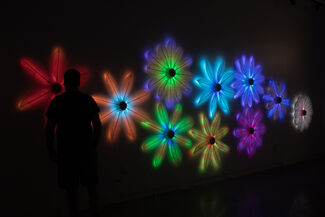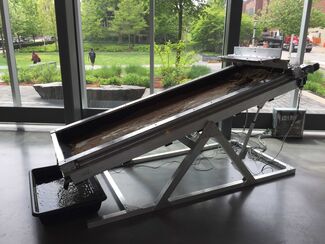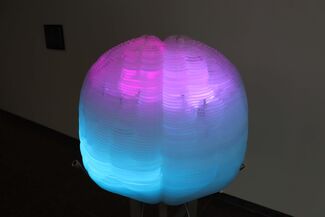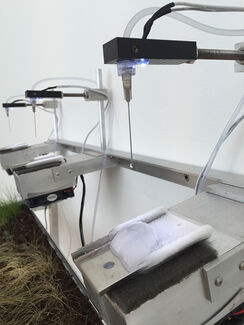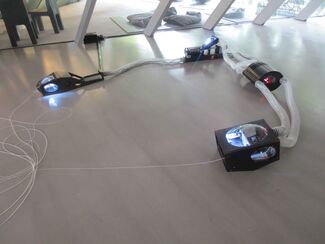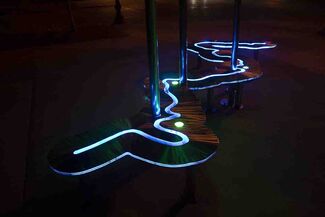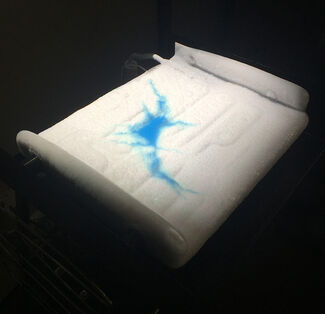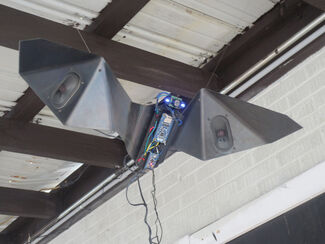
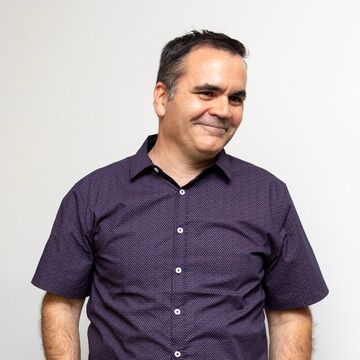
Dan Miller
Assistant Professor
Contact
Bio
BFA, 1994, Hope College, Holland, MI; MFA, 1997, The School of The Art Institute of Chicago, Chicago, IL. Exhibitions: ISEA 2024, Brisbane, Queensland University of Technology, Australia; Simulating Nature, Cohen Gallery, Brown University, RI; ISEA 2016 Hong Kong; Ebb and Flow, Evanston Art Center, Evanston. Bibliography: Issues in Science and Technology Spring 2018; Information Arts, Intersections of Art, Science, and Technology; Leonardo; ASEF Culture 360. Public Art Commissions: Ottumwa - Past and Present, Main St., Ottumwa, IA; Luminous Trails, city hall plaza, Webster City, IA; Exploring Iowa’s Renewable Energy, Robert A. Lee Recreation Center, Iowa City, IA. Awards: 2021 Art and Humanities Initiative Award, The University of Iowa; Stanley International Travel Award, University of Iowa; Old Gold Summer Fellowship, University of Iowa; C.A.A.P Grant, City of Chicago.
Personal Statement
My recent artworks investigate the parallels and incongruities between the human experience and the world we inhabit. Underlying themes explored include: climate change, human impact, the body, industrial processes, animal communication and the relationship of technology to the natural world. I am interested in the harmonies and dichotomies between the organic and the machine. Through mimicking natural systems my artworks embrace the unpredictable, evolutionary and emergent properties of nature. Time is an essential component in my work. Through the use of code I am able to sequence and control timing of events. The use of robotics allows my artworks to act as surrogate performers that create durational compositions.
Awards
Art and Humanities Initiative Award (2021), The Office of the Vice President For Research and Economic Development, University of Iowa; Stanley International Travel Award (2024), International Programs, University of Iowa; Public Digital Arts Cluster Grant, Public Digital Arts Cluster, University of Iowa; Stanley International Travel Award (2019), International Programs, University of Iowa; Art and Humanities Initiative Award (2017), The Office of the Vice President For Research and Economic Development, University of Iowa; Stanley International Travel Award (2017), International Programs, University of Iowa; Stanley International Travel Award (2016), International Programs, University of Iowa; Old Gold Summer Fellowship, College of Liberal Arts and Sciences, University of Iowa; C.A.A.P Grant, City of Chicago, Chicago, Illinois.
Exhibitions
International Exhibitions:
ISEA 2024 Brisbane; ISEA 2017 Manizales Colombia; ISEA 2016 Hong Kong; iDEAS exhibition at International Digital Media Arts Association Conference (2017 and 2016); ISEA 2012 Albuquerque, ISEA 1997 Chicago; International Festival of Electronic Art 404, Basel, Switzerland and Trieste, Italy; Tweak, Interactive Art & Live Electronic Music Festival, Limerick, Ireland.
National exhibitions:
Simulating Nature, solo exhibition, Cohen Gallery, Brown University, RI; Place, Manifest Gallery, Cincinnati, OH; Synthetic Zero, Bronx Art Space, NYC; Body and Machine 2016, Minneapolis, MN; SpotLight, Elmhurst Art Museum, IL; Faculty Biennial, Figge Museum, Davenport, IA; Objective/Subjective: Mapping, NIU Art Museum, DeKalb, IL; Conflux, Pearl Conard Gallery, Ohio State University at Mansfield, OH; Altered Landscapes, solo, Moraine Valley Community College, Palos Hills, IL; The Rockford Midwestern Exhibition, Rockford Art Museum, Rockford IL; Minneapolis, MN; in::formation, Betty Rymer Gallery, Chicago, IL; Interchange, solo, Gallery One, Elgin Community College, Elgin IL.
Work
Daniel Miller, Mutual Light, 2023. High density polyethylene (HDPE) from recycled milk jugs, stainless steel, wire, LEDs, Arduino Pro-Mini, long range temperature sensors, distance sensor, custom electronics, power supply.
Daniel Miller, Floodwaters, 2018. Media: Aluminum, steel, water, sand, gravel, tubing, HDPE plastic, polycarbonate, microcontrollers, electronics, wire, vinyl, stepper motors, servo motors, pump.
Daniel Miller, Ouroboros, 2016. Media: Arduino microcontrollers, heating elements, DC motors, linear actuators, digital temperature controllers, wiring, IR sensors, shop vacuum, power supplies and various other electronics. plasma cut steel, machined aluminum, blow formed polycarbonate, electrical wire, HDPE plastic (both extruded and cast), rubber and hardened steel blades.
